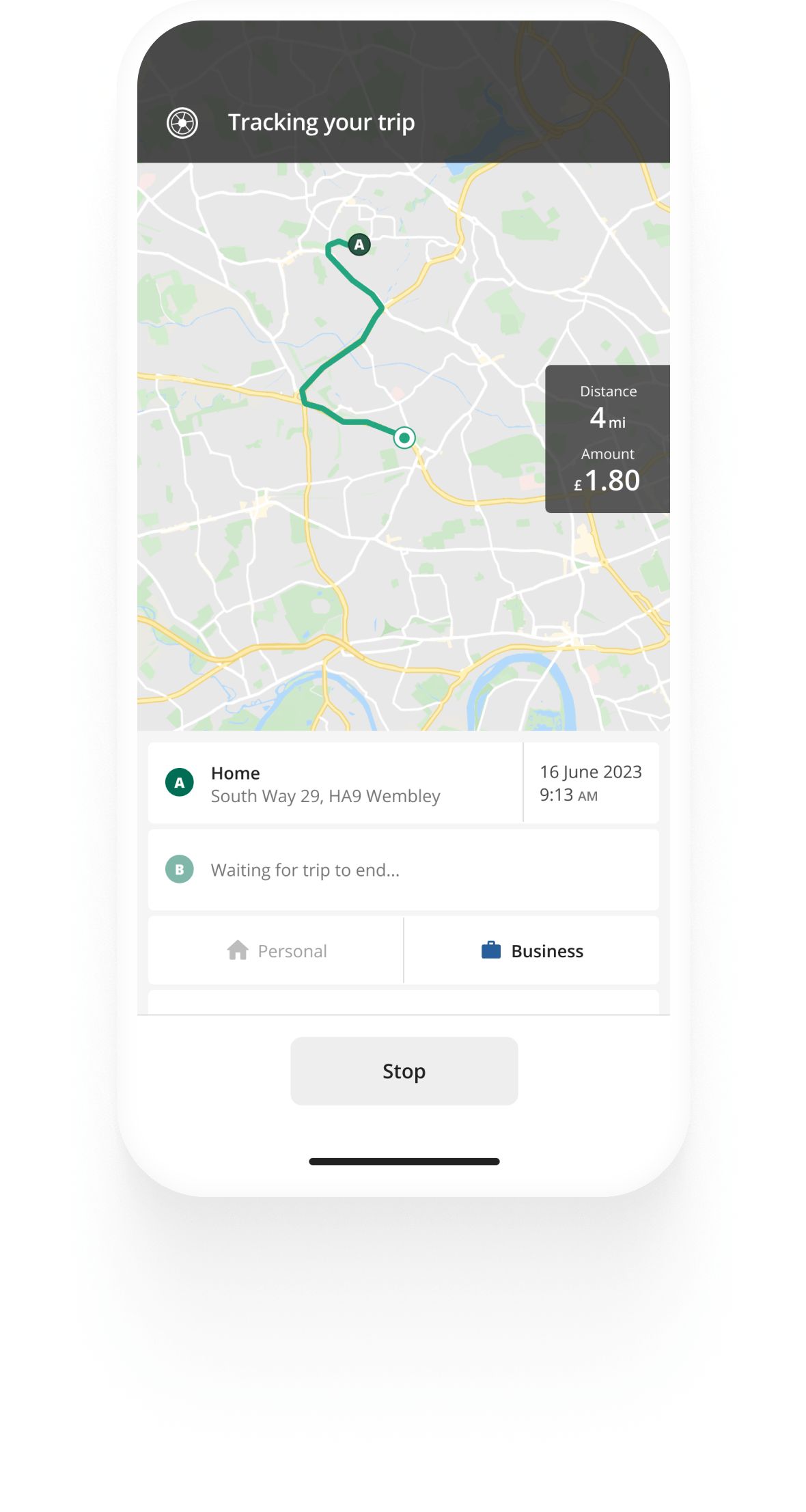Track mileage automatically
Get startedHMRC mileage claim in 5 simple steps
HMRC mileage claim rules allow you to claim expenses connected with driving your personal vehicle for business purposes. Also known as Mileage Allowance Relief (MAR), HMRC mileage claims help reduce your tax obligations.
If you travel for business with your vehicle, be it a car, van, motorcycle or bicycle, you can claim tax relief based on the approved HMRC mileage rates for the specific vehicle for that year.

Feel free to use the infographic on your website. Just remember to credit Driversnote with a link to this article.
With Driversnote you can share your vehicle log book with HMRC or your employer at the touch of a button. Try the mileage tracking app for free.
Claim mileage allowance relief in 5 steps
1. Have all documentation ready
HMRC does not allow estimating your mileage for mileage claim purposes. Ideally, you will be tracking your business drives daily or weekly in a mileage log. The log should include the date of each journey, as well as their purpose, start point and destination and total miles travelled.
Logging your business mileage with a mileage tracker makes it easier to work out and claim mileage allowance and the claim will be accurate and credible if HMRC can see precise details of the dates, miles travelled, journey and reasons.
2. Approved mileage rates
You can claim your business mileage by working out the qualified miles you’ve driven throughout the year from your mileage log and multiplying them by the approved HMRC mileage rates. The mileage rates are:
- 45p for the first 10,000 business miles and 25p above 10,000 miles for cars and vans
- For Motorcycles - 24p per mile
- For Bicycles - 20p per mile
The approved mileage rates are meant to cover all expenses of owning and running your vehicle.
3. Calculate your eligible mileage deduction
To calculate your business mileage claim, simply multiply the mileage rate for your vehicle by the business miles you’ve travelled. If you have received any mileage allowance payments from your employer throughout the year, subtract them from the eligible mileage claim amount.
Journeys that can be claimed as business-related fall into the following categories.
- You are travelling from one office to another
- You are in a temporary business location other than your usual workplace for example a meeting, or a client location
Journeys cannot be claimed as business-related if they fall into the below categories
- The journey is a part of your daily commute between an office and a private residence or any other place that’s not a permanent office
- The journey is very short and to a very close location
- It is a private journey with one or two work-related stops. The primary purpose of the trip must be business related.
4. Fill out your mileage claim form
As an employee, claim mileage by filling out the P87 form which is the document used to claim tax relief for work expenses.
As self-employed, you can claim mileage allowance relief through the Self Assessment system online at the end of every tax year.
5. Keep copies of your records
HMRC strongly recommends all taxpayers to keep their records to enable correct and complete tax returns, as well as smooth audits if any. After submitting your mileage claim, keep your records for at least five years in case HRMC audits your tax return.


Mileage tracking made easy
Trusted by millions of drivers
Automate your mileage log Automate your mileage log

Automatic mileage tracking and HMRC-compliant reporting.
Get started for free Get started for freeHow do I claim mileage back from HMRC?
You can claim mileage relief on cars, vans, motorcycles, or bicycles you use for business purposes as an employee or self-employed individual. The eligible vehicles can be leased, owned or company vehicles.
Note that mileage tax relief cannot be claimed for daily commutes between home and your permanent workplace, but for temporary work while working at your permanent workplace, such as leaving your office for a client meeting.
As self-employed, you can claim mileage allowance relief from HMRC at a flat per-mile rate or claim actual business car expenses. As an employee, you can claim MAR by the flat per-mile rate. You'll add your eligible deduction to the mileage claim form applicable to your situation at tax time.
The approved HMRC mileage rates cover the cost of owning and running your vehicle for the business portion of its use. You cannot claim separately for things like fuel, electricity, MOTs, repairs, and road tax.
Automate mileage tracking for easy record-keeping
Without accurate and reliable records, HMRC may disallow your business mileage deduction. Consider opting for an automated mileage tracker, which will record all the required details for an HMRC-compliant mileage log and will keep your records safe in a cloud should the HMRC ask for them. Check out the Driversnote Mileage Tracker, available for iOS and Android.
FAQ

Tired of logging mileage by hand?
Effortless. HMRC-compliant. Liberating.
HMRC Mileage Guide
- For self-employed
- For employees
- HMRC mileage claim in 5 steps
- Self-employed mileage allowance records
- Car allowance for employees
- Salary sacrifice car scheme
- Mileage Allowance Relief
- HMRC mileage rate 2022
- HMRC mileage rates 2021